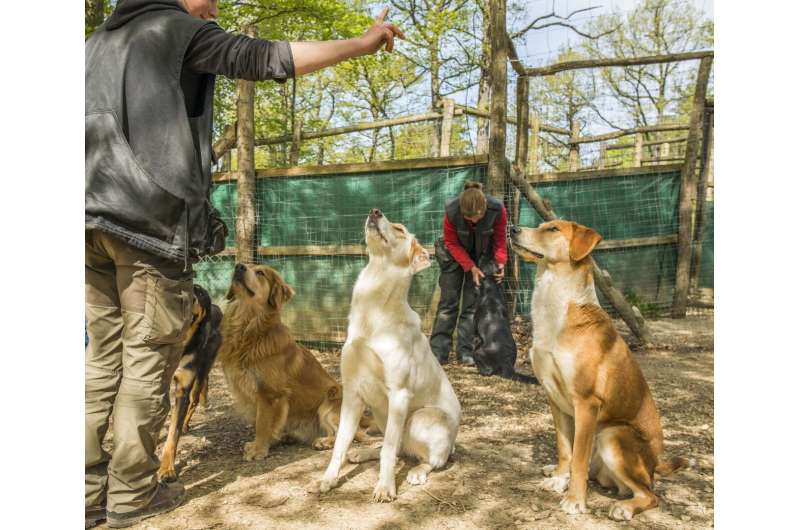Study fails to show that dogs or wolves can understand a human's reputation

A small study did not find evidence that wolves or dogs could understand the reputation of humans as "generous" or "selfish" with food, after direct or indirect interactions. Hoi-Lam Jim and colleagues at the University of Veterinary Medicine Vienna, Austria, present the findings in the open-access journal PLOS ONE on August 17, 2022.
Among animals that live in groups, deciphering the reputations of individuals can play an important role in cooperation. Because dogs can cooperate with humans, some researchers have hypothesized that dogs can categorize individual humans by observing humans' interactions with a third party. However, research on the topic has produced mixed findings. Additionally, if dogs indeed have this ability, it is unclear whether it evolved during domestication or was already present in their wolf ancestors.
To help clarify, Jim and colleagues conducted a study with nine wolves and six dogs at the Wolf Science Center in Austria. Each test animal observed interactions between two humans and a dog, in which the "generous" human fed the dog and the "selfish" human withheld food. Afterwards, the test animal demonstrated whether they understood the humans' reputations by choosing which of the two humans to approach. A second phase tested whether each animal acted the same after interacting directly with humans who either fed them or withheld food.
Statistical analysis of the results suggested that neither the dogs nor the wolves differentiated the humans after either indirect observation or direct interaction. Thus, the findings do not support the idea that dogs and wolves understand reputations.
However, the wolves did pay more attention to the generous human when observing interactions with a dog. Furthermore, two wolves and three dogs did show preference for the generous human after the combined experience of both indirect observation and direct interaction.
The researchers call for further research on the topic, perhaps involving a larger number of dogs and wolves, and with thoughtful consideration of context. For instance, it may be that some animals are more likely to form preferences in stressful or dangerous situations, although those are not possible to test experimentally for ethical reasons.
The authors add, "Overall, neither dogs nor wolves distinguished between a generous or selfish human after indirect or direct experience. However, wolves showed more attention toward the generous person during the observation phase, and some dogs and wolves did prefer the generous person when looking at indirect and direct experiences combined."
More information: Wolves and dogs fail to form reputations of humans after indirect and direct experience in a food-giving situation, PLoS ONE (2022). DOI: 10.1371/journal.pone.0271590
Journal information: PLoS ONE
Provided by Public Library of Science





















